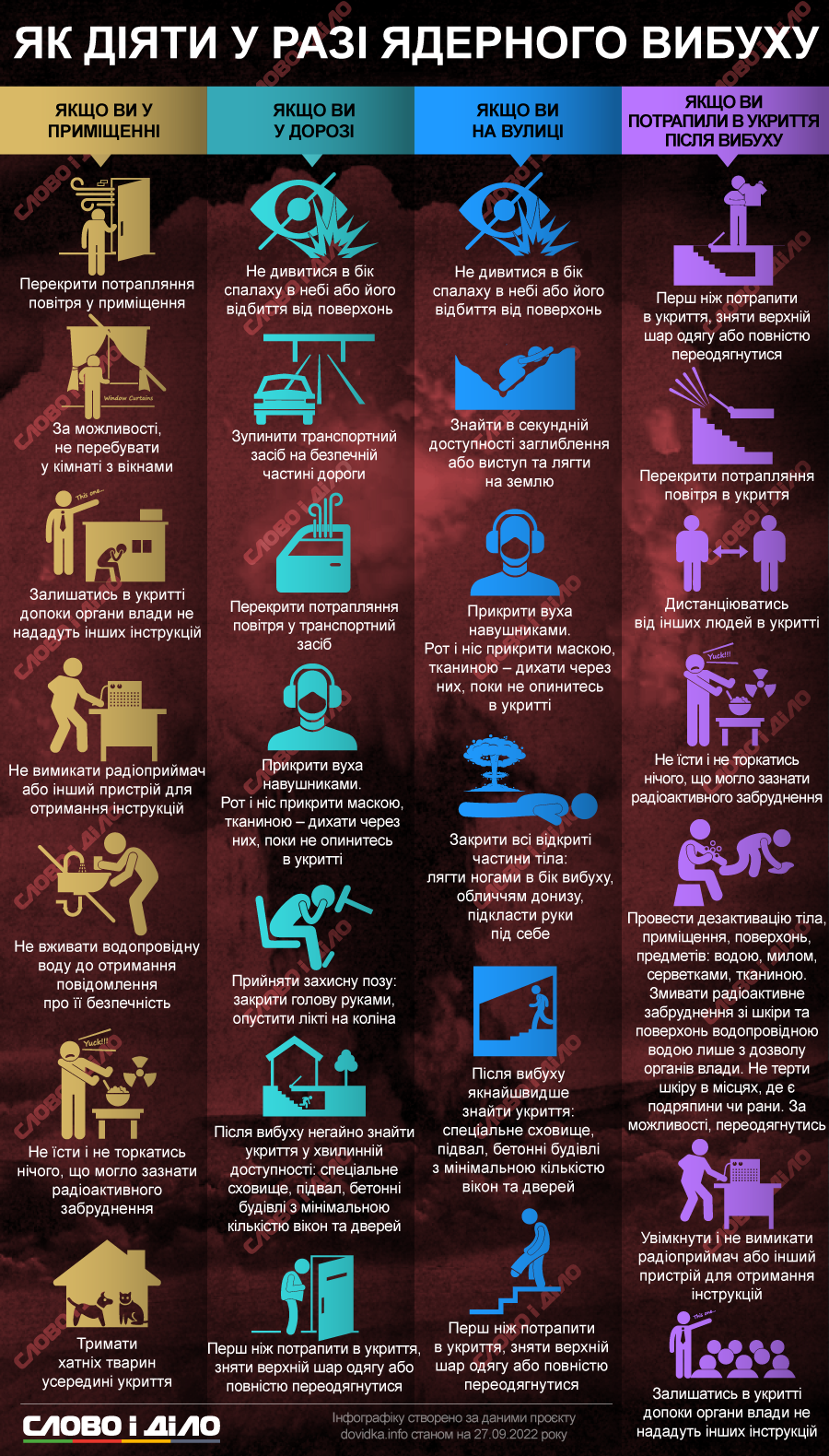Russia has been threatening Ukraine and the whole world with nuclear weapons for some time now. Since we have all made sure that during the war it is very difficult to predict the actions of the enemy - it is better to know the algorithms of actions in case of a nuclear explosion.
Nuclear weapons are high doses of radiation exposure. The use of the nucleus will be indicated by a light "mushroom", which is strictly forbidden to look at, as it can cause blindness.
The shock wave that appears 3-5 seconds after light radiation is dangerous. It is necessary to hide all exposed parts of the body from her. This can protect against burns, although gamma radiation penetrates a person through and can radically damage even the structure of DNA. It is important to have documents and medicines with you, which you can use at the first opportunity.
How to protect yourself from radiation
Ø Shelter. It is ideal if it is a tightly closed room underground (basements of residential buildings, schools, other brick buildings). In other cases, shelter can be a wall or even clothes - the denser, the better.
Ø Distance. The further from a nuclear explosion, the better for man. The world has already experienced the tragedy of Fukushima and Chernobyl, after which certain conclusions were drawn:
· nuclear mushroom can rise 70 km to the top
· flashes of the explosion were seen 1000 km away
· the fireball destroyed everything in a 10 km radius
Ø Time. The propagation of the shock wave is instantaneous. If you see a flash, immediately run to the nearest shelter. If there is no such thing - in a ditch, any shelter or simply on the ground, covering all exposed parts of the body.
What to do if you were outside at the time of the explosion:
· Close your eyes or do not look in the direction of the explosion.
· Immediately find shelter, hide, tightly closing all openings - windows, ventilation outlets, doors, cracks - with cloth, adhesive tape or other means at hand.
· If there is no shelter nearby, lie down on the ground with your head away from the explosion, face down.
· Wrap the face, hands, and respiratory tract tightly with a scarf or clothes.
What to do if you were in the car at the time of the explosion:
· Stop the car, put on the handbrake or gear.
· Crouch face down, below the line of windows.
Close windows and doors tightly.
What to do if you were indoors at the time of the explosion:
· Ideal - a room without windows with tightly closed doors.
· If there are windows in the room, close them tightly, lie face down on the floor, necessarily below the level of the windows.
It is better to make an additional shield - turn the table over and hide behind it, lie face down.
What after the explosion?
The first two days after the explosion, it is necessary to be in shelter.
During this time, the radiation dose will drop significantly.
· You can eat only products that have been hermetically closed, drink only bottled water.
· It is important to carefully listen (radio) or read any informational messages (internet) that can be obtained from official government sources.
· In case of a partial lack of electricity, the population will be alerted by the relevant services using loudspeakers using diesel generators.
· Strictly prohibited!
´ eat food that was outside the shelter, in nature
´ drink water from open sources
´ touch objects in the environment
´ undress outside the shelter.
Anti-radiation first aid kit: how to help yourself
· Potassium iodide - 1 tablet per day or 40 drops of iodine per glass of water or milk.
Medicines are taken after meals:
· Children over 12 years old and adults under 40 years old, pregnant and lactating women – 125 mg
· Children from 1 month to 3 years - 32 mg
Babies (from birth to 1 month) – 16 mg
· The acceptable period for taking potassium iodide is 24 hours before and within 6 hours after the expected start of exposure to radioactive isotopes of iodine.
· Starting iodine prophylaxis later than 14 hours after exposure to radioactive isotopes of iodine may cause more harm than expected benefit.
Remember that when exposed to radiation, a person becomes a carrier of radiation. Therefore, if you have reached a safe shelter, try not to come into contact with other people. Also, things of the person who was irradiated should not come into contact with others.


Comentarios